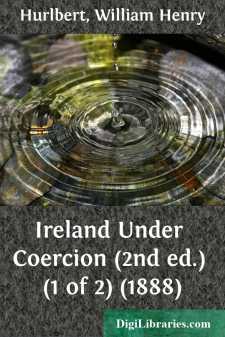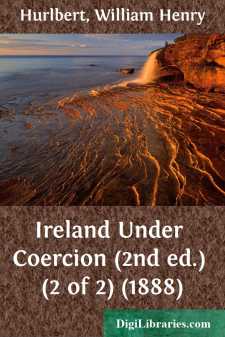Categories
- Antiques & Collectibles 13
- Architecture 36
- Art 48
- Bibles 22
- Biography & Autobiography 813
- Body, Mind & Spirit 138
- Business & Economics 28
- Children's Books 12
- Children's Fiction 9
- Computers 4
- Cooking 94
- Crafts & Hobbies 4
- Drama 346
- Education 46
- Family & Relationships 57
- Fiction 11821
- Games 19
- Gardening 17
- Health & Fitness 34
- History 1377
- House & Home 1
- Humor 147
- Juvenile Fiction 1873
- Juvenile Nonfiction 202
- Language Arts & Disciplines 88
- Law 16
- Literary Collections 686
- Literary Criticism 179
- Mathematics 13
- Medical 41
- Music 40
- Nature 179
- Non-Classifiable 1768
- Performing Arts 7
- Periodicals 1453
- Philosophy 64
- Photography 2
- Poetry 896
- Political Science 203
- Psychology 42
- Reference 154
- Religion 505
- Science 126
- Self-Help 81
- Social Science 81
- Sports & Recreation 34
- Study Aids 3
- Technology & Engineering 59
- Transportation 23
- Travel 463
- True Crime 29
Ireland Under Coercion (2nd ed.) (1 of 2) (1888)
Description:
Excerpt
PROLOGUE.
I.
This book is a record of things seen, and of conversations had, during a series of visits to Ireland between January and June 1888.
These visits were made in quest of light, not so much upon the proceedings and the purposes of the Irish “Nationalists,”—with which, on both sides of the Atlantic, I have been tolerably familiar for many years past—as upon the social and economical results in Ireland of the processes of political vivisection to which that country has been so long subjected.
As these results primarily concern Great Britain and British subjects, and as a well-founded and reasonable jealousy exists in Great Britain of American intromission in the affairs of Ireland, it is proper for me to say at the outset, that the condition of Ireland interests me not because I believe, with Cardinal Manning, that upon the future of Ireland hangs the future of the British Empire, but because I know that America is largely responsible for the actual condition of Ireland, and because the future condition of Ireland, and of the British Empire, must gravely influence the future of my own country.
In common with the vast majority of my countrymen, who come with me of what may now not improperly be called the old American stock—by which I mean the three millions of English-speaking dwellers in the New World, who righteously resented, and successfully resisted, a hundred years ago, the attempt—not of the Crown under which the Colonies held their lands, but of the British Parliament in which they were unrepresented—to take their property without their consent, and apply it to purposes not passed upon by them, I have always felt that the claim of the Irish people to a proper control of matters exclusively Irish was essentially just and reasonable. The measure of that proper control is now, as it always has been, a question not for Americans, but for the people of Great Britain and of Ireland. If Lord Edward Fitzgerald and his associates had succeeded in expelling British authority from Ireland, and in founding an Irish Republic, we should probably have recognised that Republic. Yet an American minister at the Court of St. James’s saw no impropriety in advising our Government to refuse a refuge in the United States to the defeated Irish exiles of ’98.
It is undoubtedly the opinion of every Irish American who possesses any real influence with the people of his own race in my country, that the rights and liberties of Ireland can only be effectually secured by a complete political separation from Great Britain. Nor can the right of Irish American citizens, holding this opinion, to express their sympathy with Irishmen striving in Ireland to bring about such a result, and with Englishmen or Scotchmen contributing to it in Great Britain, be questioned, any more than the right of Polish citizens of the French Republic to express their sympathy with Poles labouring in Poland for the restoration of Polish nationality. It is perhaps even less open to question than the right of Americans not of Irish race, and of Frenchmen not of Polish race, to express such sympathies; and certainly less open to question than the right of Englishmen or Americans to express their sympathy with Cubans bent on sundering the last link which binds Cuba to Spain, or with Greeks bent on overthrowing the authority of the Sultan in Crete.
But for all American citizens of whatever race, the expression of such sympathies ceases to be legitimate when it assumes the shape of action transcending the limits set by local or by international law. It is of the essence of American constitutionalism that one community shall not lay hands upon the domestic affairs of another; and it is an undeniable fact that the sympathy of the great body of the American people with Irish efforts for self-government has been diminished, not increased, since 1848, by the gradual transfer of the head-quarters and machinery of those efforts from Ireland to the United States. The recent refusal of the Mayor of New York, Mr. Hewitt, to allow what is called the “Irish National flag” to be raised over the City Hall of New York is vastly more significant of the true drift of American feeling on this subject than any number of sympathetic resolutions adopted at party conventions or in State legislatures by party managers, bent on harpooning Irish voters....




